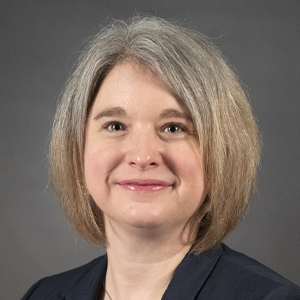Relearning the trainee’s view
I am a first-generation college graduate, a female scientist, a professor and a department chair. My lab’s research focuses on uncovering the connections between lipid signals termed prostaglandins and actin — both in the cytoplasm and the nucleus.When I learned about the Leadership Engagement and Appreciation of Differences, or LEAD, reverse mentoring program, I was immediately intrigued. What, I wondered, is reverse mentoring? As I read about the program, I thought, “Wow, what a perfect time in my career to do this.” I was in the process of moving departments and taking on a new leadership role — department chair. I rapidly applied and was paired with Fasilat Hassan, an international biomedical sciences graduate student at the University of Tennessee.

Like many researchers, as I progress in my career, I’ve lost some understanding of the issues facing trainees. LEAD breaks down the separation and power dynamic between senior faculty and trainees and provides a safe space to talk about these issues. I can learn how faculty and collegiate leaders can help, what makes the trainee experience worse and what makes it better, without Fasilat risking negative consequences for speaking up. It keeps me in touch with the trainee reality.
Fasilat has helped me understand the challenges international Ph.D. students face when moving to a new country: the financial burdens, the difficulties in finding housing and navigating transportation, the isolation until they make community connections and the struggles due to visa limitations on spousal employment.
This better understanding has pushed me to learn what resources are available on my campus; to share those resources with applicants, incoming students and current students; and to think about how to better integrate international students’ cultures into the lab, department and program and vice versa. I still have much to learn.
From Fasilat I’ve relearned that trainees don’t magically know about the process of science: How is authorship order determined? What does co-first authorship mean? Why would a PI discourage one trainee but encourage another to apply for a specific funding opportunity? How can one determine lab expectations?
I now take more time to explain processes to my trainees and make fewer assumptions about what they know. It is easy to forget they don’t just know how manuscript submissions, reviews and revisions go. I now walk them through the whole process at the beginning and remind them of the process at each step.
Recently, editors rejected one of our manuscripts after two weeks at a journal. I sat down with the trainee author and was honest about how disappointing this was, why the editors might have made this decision and what we would do about it. This gave the trainee a place to discuss their feelings and ask questions. It made a difficult situation much easier. We submitted the paper to another journal, where it is now being revised after largely positive reviews.
This program reminded me that trainees don’t know everything about lab expectations. Often, students get so focused on doing research that they skip a lab meeting or a departmental seminar. I’ve learned to pause before reacting, to consider why they might think this is okay. I can now have more productive conversations about my expectations.
In LEAD, it is sometimes hard for me to be the mentee and not the mentor. When Fasilat told me she wanted to delay her first committee meeting because she had limited data on her project, I immediately jumped in. I told her about the purpose of committee meetings and how talking through the questions you want to address and how you plan to address them is often more important for project success than talking about your data.
To combat this urge to mentor, I try to enter each meeting with a few questions or issues I want Fasilat’s perspective on. She is an amazing scientist, who is always willing to give me a hand and share her view.
I look forward to seeing where Fasilat’s career takes her and hope to maintain our mentoring relationship — in both directions — for decades to come.
When mentor and mentee switch roles
The Federation of American Societies for Experimental Biology in 2022 introduced its Leadership Engagement and Appreciation of Differences, or LEAD, reverse mentoring program pairing senior-level professionals with junior-level mentors “to gain different perspectives of individual, group, and cultural views within the workplace and scientific research communities,” according to a FASEB announcement.
Among the 2023 LEAD participants were two members of the American Society for Biochemistry and Molecular Biology. Tina Tootle, a professor of anatomy and cell biology at the University of Iowa, was a mentee. Saket Bagde, then a Ph.D. candidate at Cornell University, was a mentor. Tootle and Bagde were not paired with each other in the mentoring program.
We invited each of them to write about their experience. Read Saket Bagde’s essay.
FASEB will start accepting applications for the 2024 LEAD program in late spring. Check here for details.Enjoy reading ASBMB Today?
Become a member to receive the print edition four times a year and the digital edition monthly.
Learn moreGet the latest from ASBMB Today
Enter your email address, and we’ll send you a weekly email with recent articles, interviews and more.
Latest in Opinions
Opinions highlights or most popular articles

Women’s health cannot leave rare diseases behind
A physician living with lymphangioleiomyomatosis and a basic scientist explain why patient-driven, trial-ready research is essential to turning momentum into meaningful progress.

Making my spicy brain work for me
Researcher Reid Blanchett reflects on her journey navigating mental health struggles through graduate school. She found a new path in bioinformatics, proving that science can be flexible, forgiving and full of second chances.

The tortoise wins: How slowing down saved my Ph.D.
Graduate student Amy Bounds reflects on how slowing down in the lab not only improved her relationship with work but also made her a more productive scientist.

How pediatric cataracts shaped my scientific journey
Undergraduate student Grace Jones shares how she transformed her childhood cataract diagnosis into a scientific purpose. She explores how biochemistry can bring a clearer vision to others, and how personal history can shape discovery.

Debugging my code and teaching with ChatGPT
AI tools like ChatGPT have changed the way an assistant professor teaches and does research. But, he asserts that real growth still comes from struggle, and educators must help students use AI wisely — as scaffolds, not shortcuts.

AI in the lab: The power of smarter questions
An assistant professor discusses AI's evolution from a buzzword to a trusted research partner. It helps streamline reviews, troubleshoot code, save time and spark ideas, but its success relies on combining AI with expertise and critical thinking.

